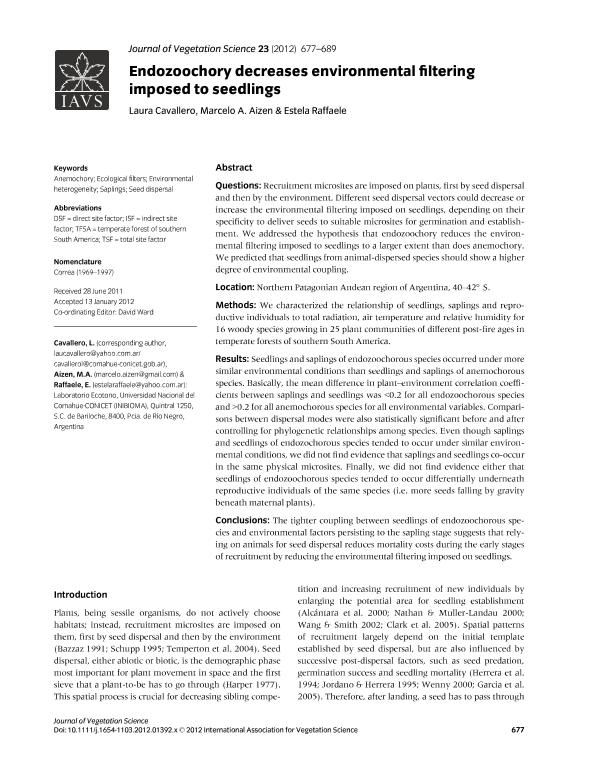Mostrar el registro sencillo del ítem
dc.contributor.author
Cavallero, Laura

dc.contributor.author
Aizen, Marcelo Adrian

dc.contributor.author
Raffaele, Estela

dc.date.available
2019-03-18T17:34:45Z
dc.date.issued
2012-08
dc.identifier.citation
Cavallero, Laura; Aizen, Marcelo Adrian; Raffaele, Estela; Endozoochory decreases environmental filtering imposed to seedlings; Wiley Blackwell Publishing, Inc; Journal of Vegetation Science; 23; 4; 8-2012; 677-689
dc.identifier.issn
1100-9233
dc.identifier.uri
http://hdl.handle.net/11336/71872
dc.description.abstract
Questions: Recruitment microsites are imposed on plants, first by seed dispersal and then by the environment. Different seed dispersal vectors could decrease or increase the environmental filtering imposed on seedlings, depending on their specificity to deliver seeds to suitable microsites for germination and establishment. We addressed the hypothesis that endozoochory reduces the environmental filtering imposed to seedlings to a larger extent than does anemochory. We predicted that seedlings from animal-dispersed species should show a higher degree of environmental coupling. Location: Northern Patagonian Andean region of Argentina, 40-42° S. Methods: We characterized the relationship of seedlings, saplings and reproductive individuals to total radiation, air temperature and relative humidity for 16 woody species growing in 25 plant communities of different post-fire ages in temperate forests of southern South America. Results: Seedlings and saplings of endozoochorous species occurred under more similar environmental conditions than seedlings and saplings of anemochorous species. Basically, the mean difference in plant-environment correlation coefficients between saplings and seedlings was <0.2 for all endozoochorous species and >0.2 for all anemochorous species for all environmental variables. Comparisons between dispersal modes were also statistically significant before and after controlling for phylogenetic relationships among species. Even though saplings and seedlings of endozochorous species tended to occur under similar environmental conditions, we did not find evidence that saplings and seedlings co-occur in the same physical microsites. Finally, we did not find evidence either that seedlings of endozoochorous species tended to occur differentially underneath reproductive individuals of the same species (i.e. more seeds falling by gravity beneath maternal plants). Conclusions: The tighter coupling between seedlings of endozoochorous species and environmental factors persisting to the sapling stage suggests that relying on animals for seed dispersal reduces mortality costs during the early stages of recruitment by reducing the environmental filtering imposed on seedlings. © 2012 International Association for Vegetation Science.
dc.format
application/pdf
dc.language.iso
eng
dc.publisher
Wiley Blackwell Publishing, Inc

dc.rights
info:eu-repo/semantics/openAccess
dc.rights.uri
https://creativecommons.org/licenses/by-nc-sa/2.5/ar/
dc.subject
Anemochory
dc.subject
Ecological Filters
dc.subject
Environmental Heterogeneity
dc.subject
Saplings
dc.subject
Seed Dispersal
dc.subject.classification
Otras Ciencias Biológicas

dc.subject.classification
Ciencias Biológicas

dc.subject.classification
CIENCIAS NATURALES Y EXACTAS

dc.title
Endozoochory decreases environmental filtering imposed to seedlings
dc.type
info:eu-repo/semantics/article
dc.type
info:ar-repo/semantics/artículo
dc.type
info:eu-repo/semantics/publishedVersion
dc.date.updated
2019-03-08T16:43:50Z
dc.journal.volume
23
dc.journal.number
4
dc.journal.pagination
677-689
dc.journal.pais
Reino Unido

dc.journal.ciudad
Londres
dc.description.fil
Fil: Cavallero, Laura. Consejo Nacional de Investigaciones Científicas y Técnicas. Centro Científico Tecnológico Conicet - Patagonia Norte. Instituto de Investigaciones en Biodiversidad y Medioambiente. Universidad Nacional del Comahue. Centro Regional Universidad Bariloche. Instituto de Investigaciones en Biodiversidad y Medioambiente; Argentina
dc.description.fil
Fil: Aizen, Marcelo Adrian. Consejo Nacional de Investigaciones Científicas y Técnicas. Centro Científico Tecnológico Conicet - Patagonia Norte. Instituto de Investigaciones en Biodiversidad y Medioambiente. Universidad Nacional del Comahue. Centro Regional Universidad Bariloche. Instituto de Investigaciones en Biodiversidad y Medioambiente; Argentina
dc.description.fil
Fil: Raffaele, Estela. Consejo Nacional de Investigaciones Científicas y Técnicas. Centro Científico Tecnológico Conicet - Patagonia Norte. Instituto de Investigaciones en Biodiversidad y Medioambiente. Universidad Nacional del Comahue. Centro Regional Universidad Bariloche. Instituto de Investigaciones en Biodiversidad y Medioambiente; Argentina
dc.journal.title
Journal of Vegetation Science

dc.relation.alternativeid
info:eu-repo/semantics/altIdentifier/url/http://onlinelibrary.wiley.com/doi/10.1111/j.1654-1103.2012.01392.x/abstract
dc.relation.alternativeid
info:eu-repo/semantics/altIdentifier/doi/https://doi.org/10.1111/j.1654-1103.2012.01392.x
Archivos asociados
